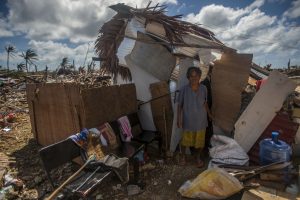Memo #251
By Leonora C. Angeles – nora.angeles [at] ubc.ca
 The world has come to the Philippines to support local and national rescue and relief efforts in the aftermath of Typhoon Haiyan. Emergency teams and humanitarian aid workers and goods from abroad have added to many inspiring local initiatives to help survivors in the most ravaged areas in Eastern Visayas. But looking ahead, what are the biggest challenges facing the Visayas and the country as a whole? They are first, listening to and addressing civil society concerns about the impact of climate change, and second, designing and implementing a sustainable post-disaster reconstruction and recovery plan.
The world has come to the Philippines to support local and national rescue and relief efforts in the aftermath of Typhoon Haiyan. Emergency teams and humanitarian aid workers and goods from abroad have added to many inspiring local initiatives to help survivors in the most ravaged areas in Eastern Visayas. But looking ahead, what are the biggest challenges facing the Visayas and the country as a whole? They are first, listening to and addressing civil society concerns about the impact of climate change, and second, designing and implementing a sustainable post-disaster reconstruction and recovery plan.
Following the passionate appeal of the Philippine delegation head at the United Nations Climate Change Conference in Warsaw this month, a group of concerned NGOs led by the Philippine Movement for Climate Justice and Freedom from Debt Coalition are demanding climate justice, particularly the “immediate, drastic cuts of global GHG emissions” by “banning new fossil fuel projects and stopping the excessive consumption of energy by elites and corporations.” They are also demanding “an end to false solutions, the further expansion of carbon markets, and corporate domination of the climate negotiations” and “the mobilization of public finance for swift and just transition to low carbon economies,” as well as “reparations for inescapable losses and damage” from climate crises.
More immediately and on the ground, pre-Christmas fundraisers and festivities have become relief efforts. An 18-day national campaign (beginning November 25) against gender violence has been adjusted to highlight gender issues in emergency response and reconstruction protocols (e.g. sanitary napkins and milk in relief packages, separate facilities and provisions for women and children in the temporary shelters, vigilance against sexual assault and trafficking in child and women in disaster areas).
In other words, out of this tragedy may come opportunities for mainstreaming gender-aware disaster risk reduction and resilience in both planning and implementation. For the responses to be successful, it is essential they be inclusive, involving all stakeholders in determining the objectives and the design of policies, as well as in their eventual monitoring and evaluation.
About the Author:
Leonora C. Angeles is Associate Professor of Community and Regional Planning and Women’s and Gender Studies at the University of British Columbia and principal investigator of the SSHRC Partnership Development project, “Collaborative Governance of Urbanizing Watersheds: Integrated Research, Institution- and Capacity-Building for Sustainability and Climate Risk Adaptation in Angat River Region, Philippines.”

In Guiuan, Eastern Samar Province, a woman stands amidst the desolation following Typhoon Haiyan (Source: Liam Kennedy).
Links:
- “‘It’s time to stop this madness,’ – Philippines Plea at UN Climate Talks,” Responding to Climate Change, November 2013
- “Making disaster risk reduction gender-sensitive: policy and practical guidelines,” United Nations Office for Disaster Risk Reduction (UNISDR)
- “Gender and Disaster Risk Reduction,” UNESCO
- “Mainstreaming Gender in Disaster Management Policy: Key issues and Challenges in the Asia-Pacific Region,” Dr. Sepali Kottegoda, Asia Pacific Women’s Watch
Related Memos:
See our other memos on the Philippines.
Comments are closed, but trackbacks and pingbacks are open.